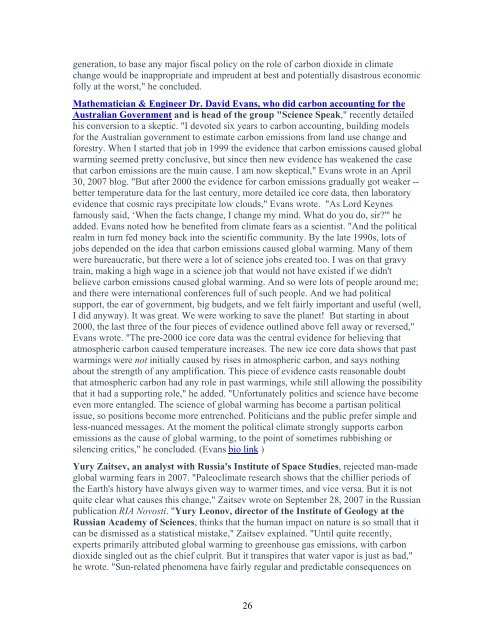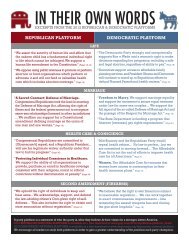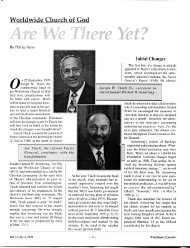U.S. Senate Report: Over 400 Prominent Scientists Disputed ... - NJIAT
U.S. Senate Report: Over 400 Prominent Scientists Disputed ... - NJIAT
U.S. Senate Report: Over 400 Prominent Scientists Disputed ... - NJIAT
You also want an ePaper? Increase the reach of your titles
YUMPU automatically turns print PDFs into web optimized ePapers that Google loves.
generation, to base any major fiscal policy on the role of carbon dioxide in climate<br />
change would be inappropriate and imprudent at best and potentially disastrous economic<br />
folly at the worst," he concluded.<br />
Mathematician & Engineer Dr. David Evans, who did carbon accounting for the<br />
Australian Government and is head of the group "Science Speak," recently detailed<br />
his conversion to a skeptic. "I devoted six years to carbon accounting, building models<br />
for the Australian government to estimate carbon emissions from land use change and<br />
forestry. When I started that job in 1999 the evidence that carbon emissions caused global<br />
warming seemed pretty conclusive, but since then new evidence has weakened the case<br />
that carbon emissions are the main cause. I am now skeptical," Evans wrote in an April<br />
30, 2007 blog. "But after 2000 the evidence for carbon emissions gradually got weaker --<br />
better temperature data for the last century, more detailed ice core data, then laboratory<br />
evidence that cosmic rays precipitate low clouds," Evans wrote. "As Lord Keynes<br />
famously said, ‘When the facts change, I change my mind. What do you do, sir?'" he<br />
added. Evans noted how he benefited from climate fears as a scientist. "And the political<br />
realm in turn fed money back into the scientific community. By the late 1990s, lots of<br />
jobs depended on the idea that carbon emissions caused global warming. Many of them<br />
were bureaucratic, but there were a lot of science jobs created too. I was on that gravy<br />
train, making a high wage in a science job that would not have existed if we didn't<br />
believe carbon emissions caused global warming. And so were lots of people around me;<br />
and there were international conferences full of such people. And we had political<br />
support, the ear of government, big budgets, and we felt fairly important and useful (well,<br />
I did anyway). It was great. We were working to save the planet! But starting in about<br />
2000, the last three of the four pieces of evidence outlined above fell away or reversed,"<br />
Evans wrote. "The pre-2000 ice core data was the central evidence for believing that<br />
atmospheric carbon caused temperature increases. The new ice core data shows that past<br />
warmings were not initially caused by rises in atmospheric carbon, and says nothing<br />
about the strength of any amplification. This piece of evidence casts reasonable doubt<br />
that atmospheric carbon had any role in past warmings, while still allowing the possibility<br />
that it had a supporting role," he added. "Unfortunately politics and science have become<br />
even more entangled. The science of global warming has become a partisan political<br />
issue, so positions become more entrenched. Politicians and the public prefer simple and<br />
less-nuanced messages. At the moment the political climate strongly supports carbon<br />
emissions as the cause of global warming, to the point of sometimes rubbishing or<br />
silencing critics," he concluded. (Evans bio link )<br />
Yury Zaitsev, an analyst with Russia's Institute of Space Studies, rejected man-made<br />
global warming fears in 2007. "Paleoclimate research shows that the chillier periods of<br />
the Earth's history have always given way to warmer times, and vice versa. But it is not<br />
quite clear what causes this change," Zaitsev wrote on September 28, 2007 in the Russian<br />
publication RIA Novosti. "Yury Leonov, director of the Institute of Geology at the<br />
Russian Academy of Sciences, thinks that the human impact on nature is so small that it<br />
can be dismissed as a statistical mistake," Zaitsev explained. "Until quite recently,<br />
experts primarily attributed global warming to greenhouse gas emissions, with carbon<br />
dioxide singled out as the chief culprit. But it transpires that water vapor is just as bad,"<br />
he wrote. "Sun-related phenomena have fairly regular and predictable consequences on<br />
26








